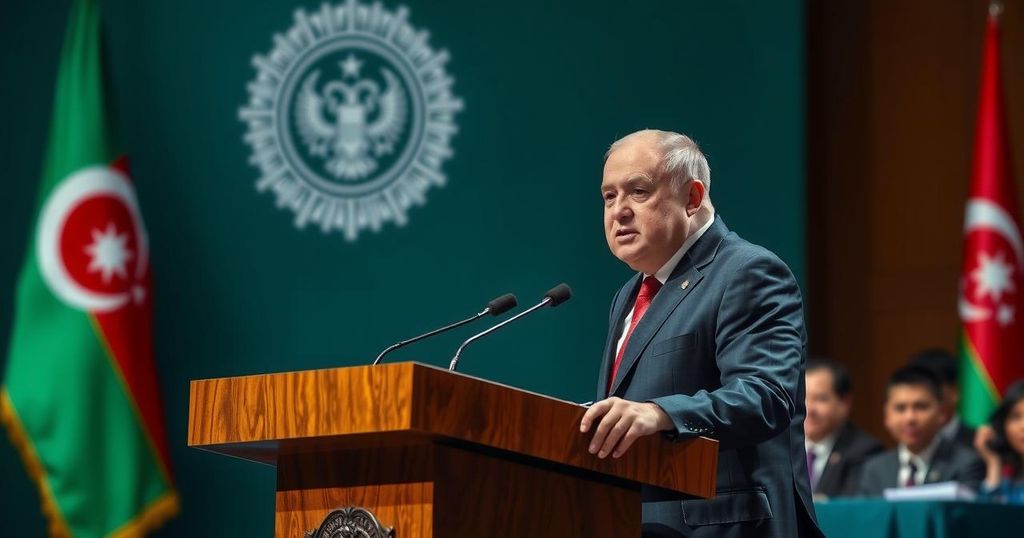Aliyev’s Controversial Rhetoric at COP29 Raises Climate and Diplomatic Concerns

President Ilham Aliyev’s assertive rhetoric at COP29 has raised eyebrows internationally, overshadowing climate goals with accusations against Western nations and a strong advocacy for fossil fuels. His remarks resulted in diplomatic tensions, particularly with France and the Netherlands, leading to mutual summoning of ambassadors. Critics apprehend that Azerbaijan’s engagement in COP29 serves more for political leverage than for genuine climate progress amidst ongoing human rights concerns in the country.
Azerbaijan’s President Ilham Aliyev has ignited considerable controversy at the COP29 climate talks held in Baku, as his confrontational speeches and staunch support for fossil fuel usage seem to overshadow the event’s global climate agenda. In opening remarks, Aliyev harshly condemned the West for what he deemed hypocrisy, further escalating tensions with accusations against France and the Netherlands concerning their overseas territories. During a summit focusing on Small Island Developing Countries, he specifically criticized European institutions, labeling them as corrupt and holding them accountable for alleged injustices.
This aggressive rhetoric quickly provoked backlash from European diplomats, with France’s Ecological Transition Minister condemning his comments as unacceptable. The confrontation culminated in a diplomatic row, with both France and Azerbaijan summoning each other’s ambassadors in response to the verbal exchanges. Furthermore, EU officials joined the criticism, emphasizing that Aliyev’s statements undermine Azerbaijan’s credibility as a host for COP29.
The president’s narrative has increasingly adopted an anti-colonial stance, particularly against France, particularly following Azerbaijan’s recent military actions in Nagorno-Karabakh. Through the Baku Initiative, Azerbaijan promotes pro-independence movements in French territories, signalling an intent to leverage global forums for political gain. Amidst these tensions, Aliyev’s unflinching support for fossil fuel production, which he refers to as a “gift from God,” raises questions about his true commitment to climate progress.
Critics have accused Azerbaijan of using COP29 as a platform for greenwashing, attempting to mask its poor environmental standards and human rights record behind a façade of international diplomacy. Observations made during the summit highlight that, despite rallying against civil society dissent, the government faces significant scrutiny over political repression within its borders, including the imprisonment of journalists and activists. As a result, Aliyev’s stance at COP29 has led many to suspect that Azerbaijan is more interested in furthering its own geopolitical ambitions rather than pursuing genuine climate action.
The backdrop of President Ilham Aliyev’s controversial engagement during COP29 revolves around Azerbaijan’s reputation in global climate discussions, particularly as a fossil fuel-dependent nation. Hosting the climate talks has provided Aliyev a significant platform to promote his country’s interests, which appear to be at odds with the broader goals of the conference. The escalating tensions with European countries, largely revolving around historical grievances related to colonialism and regional conflicts, have fueled a divisive atmosphere that questions the integrity of Azerbaijan’s presidency at COP29. Moreover, the rising international scrutiny regarding Azerbaijan’s human rights practices adds a critical dimension to the complexities of this climate dialogue.
In conclusion, President Ilham Aliyev’s confrontational rhetoric at COP29 has stirred significant diplomatic tensions, overshadowing the conference’s environmental goals with calls for political accountability. His staunch defense of the fossil fuel industry and aggressive stance against Western nations raises serious concerns about Azerbaijan’s genuine commitment to climate action. Furthermore, the evident disconnect between Azerbaijan’s internal human rights situation and its external climate narrative indicates an urgent need for re-evaluation of its role in international environmental discourse.
Original Source: www.euractiv.com








